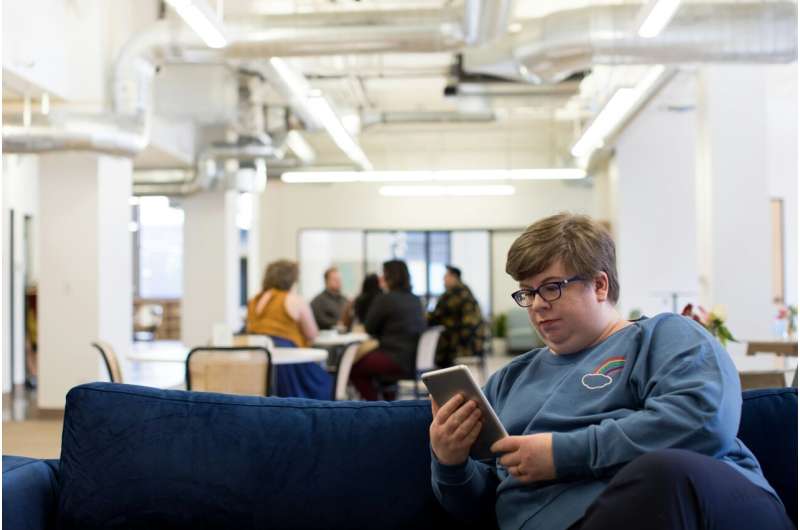This article has been reviewed according to Science X's editorial process and policies. Editors have highlighted the following attributes while ensuring the content's credibility:
fact-checked
peer-reviewed publication
trusted source
proofread
Tech alone can't replace human coaches in obesity treatment, study finds

A Northwestern Medicine study shows that technology alone can't replace the human touch to produce meaningful weight loss in obesity treatment. The study, titled "An Adaptive Behavioral Intervention for Weight Loss Management: A Noninferiority Randomized Clinical Trial,"
was published May 14 in JAMA.
"Giving people technology alone for the initial phase of obesity treatment produces unacceptably worse weight loss than giving them treatment that combines technology with a human coach," said corresponding study author Bonnie Spring, director of the Center for Behavior and Health and professor of preventive medicine at Northwestern University Feinberg School of Medicine.
The need for low cost but effective obesity treatments delivered by technology has become urgent as the ongoing obesity epidemic exacerbates burgeoning health care costs.
But current technology is not advanced enough to replace human coaches, Spring said.
In the new SMART study, people who initially only received technology without coach support were less likely to have a meaningful weight loss, considered to be at least 5% of body weight, compared to those who had a human coach at the start.
Investigators intensified treatment quickly (by adding resources after just two weeks) if a person showed less than optimal weight loss, but the weight loss disadvantage for those who began their weight loss effort without coach support persisted for six months, the study showed.
Eventually more advanced technology may be able to supplant human coaches, Spring said.
"At this stage, the average person still needs a human coach to achieve clinically meaningful weight loss goals because the tech isn't sufficiently developed yet," Spring said. "We may not be so far away from having an AI chat bot that can sub for a human, but we are not quite there yet. It's within reach. The tech is developing really fast."
Previous research showed that mobile health tools for tracking diet, exercise and weight increase engagement in behavioral obesity treatment. Before this new study, it wasn't clear whether they produced clinically acceptable weight loss in the absence of support from a human coach.
Scientists are now trying to parse what human coaches do that makes them successful, and how AI can better imitate a human, not just in terms of content but in emotional tone and context awareness, Spring said.
Surprising results
"We predicted that starting treatment with technology alone would save money and reduce burden without undermining clinically beneficial weight loss, because treatment augmentation occurred so quickly once poor weight loss was detected," Spring said. "That hypothesis was disproven, however."
Drug and surgical interventions also are available for obesity but have some drawbacks. "They're very expensive, convey medical risks and side effects and aren't equitably accessible," Spring said. Most people who begin taking a GLP-1 agonist stop taking the drug within a year against medical advice, she noted.
Many people can achieve clinically meaningful weight loss without anti-obesity medications, bariatric surgery or even behavioral treatment, Spring said. In the SMART study, 25% of people who began treatment with technology alone achieved 5% weight loss after six months without any treatment augmentation. (In fact, the team had to take back the study technologies after three months to recycle to new participants.)
An unsolved problem in obesity treatment is matching treatment type and intensity to individuals' needs and preferences. "If we could just tell ahead of time who needs which treatment at what intensity, we might start to manage the obesity epidemic," Spring said.
The SMART Weight Loss Management study was a randomized controlled trial that compared two different stepped care treatment approaches for adult obesity. Stepped care offers a way to spread treatment resources across more of the population in need.
The treatment that uses the least resources but that will benefit some people is delivered first; then treatment is intensified only for those who show insufficient response. Half of participants in the SMART study began their weight loss treatment with technology alone. The other half began with gold standard treatment involving both technology and a human coach.
The technology used in the SMART trial was a Wireless Feedback System (an integrated app, Wi-Fi scale and Fitbit) that participants used to track and receive feedback about their diet, activity and weight.
Four-hundred adults between ages 18–60 with obesity were randomly assigned to begin three months of stepped care behavioral obesity treatment beginning with either the Wireless Feedback System (WFS) alone or the WFS plus telehealth coaching. Weight loss was measured after two, four and eight weeks of treatment, and treatment was intensified at the first sign of suboptimal weight loss (less than .5 pounds per week).
Treatment for both groups began with the same WFS tracking technology, but standard-of-care treatment also transmitted the participant's digital data to a coach, who used it to provide behavioral coaching by telehealth.
Those showing suboptimal weight loss in either group were re-randomized once to either of two levels of treatment intensification: modest (adding an inexpensive technology component—supportive messaging) or vigorous (adding both messaging plus a more costly traditional weight loss treatment component—coaching for those who hadn't received it, meal replacement for those who'd already received coaching).
More information: An Adaptive Behavioral Intervention for Weight Loss Management: A Noninferiority Randomized Clinical Trial, JAMA (2024). jamanetwork.com/journals/jama/ … .1001/jama.2024.0821



















